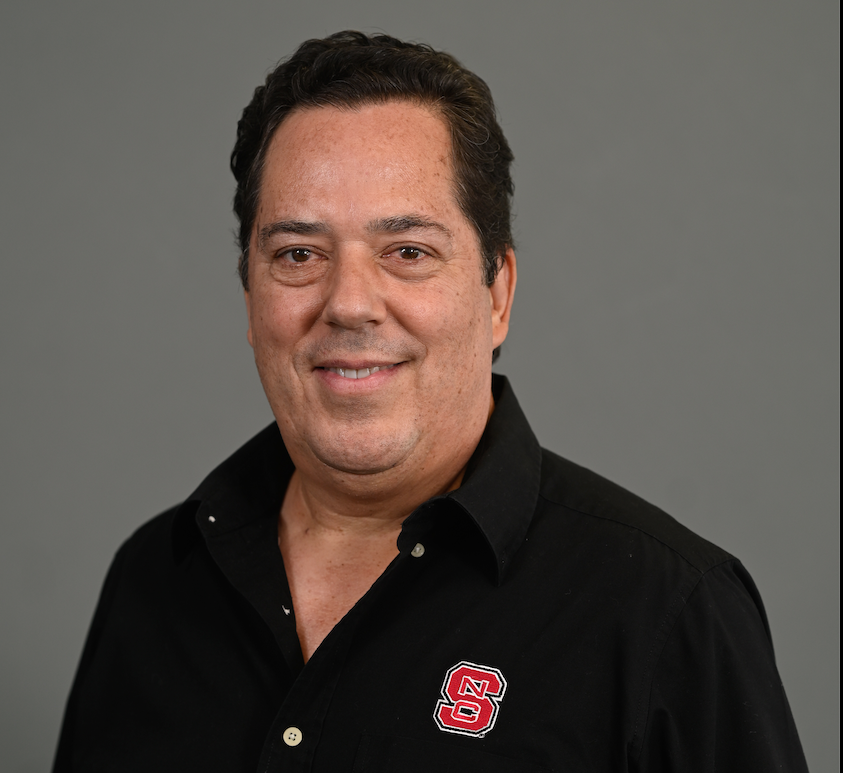Cesar Delgado

he/him/his
Associate Professor
Department of Science, Technology, Engineering, and Mathematics Education
Poe Hall 326N
919-515-6903 cdelgad@ncsu.eduBio
Selected Scholarly Publications
Honors and Awards
- NC State Outstanding Teacher Award (2019)
- Publons Top Peer Reviewer (2019)
Editorial Boards
- Journal of Research in Science Teaching
- Editorial Review Board 2018-2022
- Associate Editor, 2022-2024
- International Journal of Science Education Editorial Review Board 2022-
Education
Doctor of Philosophy Science Education the University of Michigan, Ann Arbor 2009
Master of Science Chemistry the University of Michigan, Ann Arbor 2008
Master of Arts Learning Technologies the University of Michigan, Ann Arbor 2008
Master of Arts Secondary Education the University of Alabama, Tuscaloosa 2003
Bachelor of Science Chemical Engineering the University of California at Los Angeles
Area(s) of Expertise
Dr. Delgado researches students’ knowledge and learning of the magnitude of variables, including spatial and temporal scale. He also studies visual representations, project-based learning and modeling. His externally-funded research includes an NSF EHR CORE grant developing virtual reality environments for the teaching and learning of scale (co-PI), and an NSF IGE grant analyzing and improving graduate engineering and computer science courses (co-PI). He teaches courses on technological tools for teaching, the learning sciences, learning theories, equity and diversity, and methods for teaching. He wrote the supporting materials for a course on project-based learning that is being enacted in 44 universities in 21 states and the District of Columbia.
Publications
- A scaffolding model for designing and implementing work-integrated learning experiences based on the analysis of the university and company's arrangements , HIGHER EDUCATION (2025)
- Analysis of two pedagogical approaches to foster discipline integrations in an educational data mining class using communities of practice , INTERNATIONAL JOURNAL OF STEM EDUCATION (2025)
- Artificial intelligence: Tool or teammate? , JOURNAL OF RESEARCH IN SCIENCE TEACHING (2024)
- Exploring the impact of an intervention on pre-service science teachers' attitudes and beliefs about gender and sexual diversity-inclusive science teaching , JOURNAL OF RESEARCH IN SCIENCE TEACHING (2024)
- Implementation and Evaluation of Impact on Student Learning of an Automated Platform to Score and Provide Feedback on Constructed-Response Problems in Chemistry , ARTIFICIAL INTELLIGENCE IN EDUCATION: POSTERS AND LATE BREAKING RESULTS, WORKSHOPS AND TUTORIALS, INDUSTRY AND INNOVATION TRACKS, PRACTITIONERS, DOCTORAL CONSORTIUM AND BLUE SKY, AIED 2024, PT I (2024)
- Using communities of practice to investigate work-integrated learning in engineering education: a grounded theory approach , HIGHER EDUCATION (2024)
- Generating a framework for gender and sexual diversity-inclusive STEM education , SCIENCE EDUCATION (2023)
- Shrink or grow the kids? Scale cognition in an immersive virtual environment for K-12 summer camp , 2023 IEEE CONFERENCE ON VIRTUAL REALITY AND 3D USER INTERFACES ABSTRACTS AND WORKSHOPS, VRW (2023)
- Leveraging the epistemic emotion of awe as a pedagogical tool to teach science , INTERNATIONAL JOURNAL OF SCIENCE EDUCATION (2022)
- A taxonomy of cognitive image functions for science curriculum materials: identifying and creating 'performative' visual displays , INTERNATIONAL JOURNAL OF SCIENCE EDUCATION (2021)
Grants
One major challenge in enabling learner to construct an accurate understanding of scale and perform appropriate mathematical operations lies in the inaccessibility of environments and processes that are not within the realm of regular human experience. Many important entities in sizes cannot be perceived by the human eye, which increases the difficulty for learners to appreciate the differences between cells and atoms. These challenges in learning scale may be addressed by visualization in virtual reality (VR), which is a computer-generated graphical environment that can is easily programmable. With the interactivity of VR, learners can experience scientific entities and relationships with deep immersion, high user control, and minimization of the representational distance from natural phenomena.
Recent policy documents for graduate STEM education note that engineering programs do not adequately help students develop abilities to work in collaborative and team settings, to communicate to diverse audiences, and to deal with diverse opinions, ideas, and backgrounds. Additionally, the emergence of new fields at the interface of two or more disciplines requires a workforce with the ability to work collaboratively with people from different disciplines. Moreover, most engineering problems in the field involve multiple heterogeneous teams working on subsystems that need to be integrated as a working system. Students need to learn how to work within and across teams - and disciplines. In this project we seek to improve graduate engineering education by studying students������������������ interactions and learning within and across collaborative groups, when integrating into professional engineering endeavors, and when engaged in interdisciplinary projects, in order to identify promising approaches, identify obstacles, and generate theory for the effective preparation for the workforce of graduate engineering students. We are guided by the theoretical framework of communities of practice (CoP), which has a strong emphasis on collaboration, diverse groups and audiences, and the need to communicate across disciplinary and cultural backgrounds. The CoP framework also provides mechanisms for the enculturation of novices into disciplinary groups, as well as for the dissemination of ideas across such groups. We have selected three courses from three different departments to foster and study this CoP approach. The selected classes afford CoP-guided studies of different grain sizes, using diverse concepts from the CoP framework, and in a variety of disciplines. Through this approach that involves various settings and granularities, we seek to develop a broader view of CoPs in engineering that can build theory for this field and guide implementation across subfields of engineering education.
Groups
Honors and Awards
- NC State Outstanding Teacher Award (2019)
- Publons Top Peer Reviewer (2019)
News
- Advisee Gary Wright wins NARST Outstanding Dissertation Research Award
- Advisee Gary Wright wins NARST Outstanding Dissertation Research Award
- NSF EHR CORE grant: Virtual Reality
- Virtual reality supports embodied cognition and learning
- Editorial Service
- National Impact on Teacher Preparation
- Professional Development for Latin American teachers
- Quality Matters certification of online course
- NCSU Outstanding Teacher Award